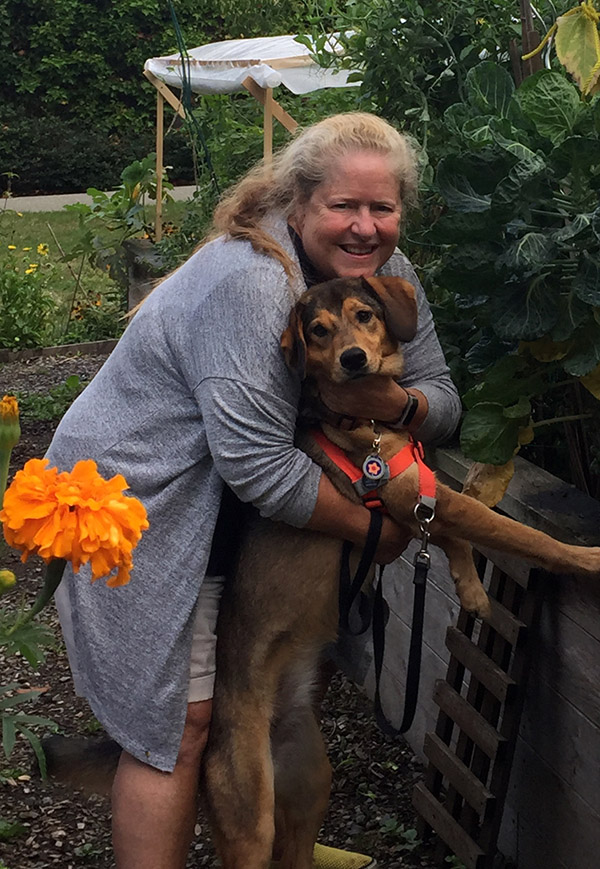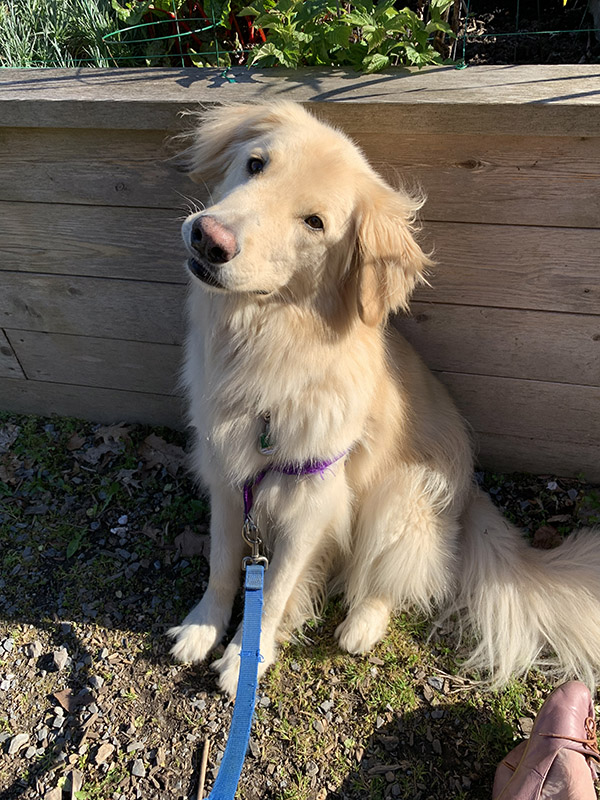
 Laurie Ford
Laurie FordDr. Laurie Ford at UBC has school psychologists to train, students adjusting to online learning, and innovations to replace hands-on experiences. She also has a community garden and two great dogs!
Laurie Ford
“Every night we talk on FaceMail”.
Two things are getting Dr. Laurie Ford through this pandemic in a positive way. One is her nightly ‘FaceMail’ chats with her dad in Oklahoma. Not sure if this means FaceTime, or FaceBook, or Zoom or some other video chat platform, but dad calls it FaceMail and so FaceMail it is. The other is a community garden where Dr. Ford is the President. The garden has become a meeting-place and something of a pandemic oasis throughout the past year. Sometimes up to six or seven people, Laurie and her friends, will head to the garden after work, sit well-distanced on the various plots, and share a laugh and a glass of wine. Maybe pull some weeds. It’s a nice break from long days at work.
“I’m getting a lot of work done – when all I have to do is go to the front of my house and come back. The bad thing is I think many of us are working too much, as the lines between work and home are blurring.”
Even Dr. Ford’s beloved community garden has become part of that blurring of work-home-life, her meetings with friends inspired her to do the same with her grad students. A few months into the pandemic, she suddenly realized that most of her students lived in Vancouver but had never actually met one another in person! With the exception of one student stuck in Australia and one stuck in Alaska, she invited them all to meet, in person, at the garden. (The two stranded students were able to join virtually, by Zoom.)
Dr. Ford is at UBC. She is the Director of Training for the School and Applied Child Psychology program and has been involved in training school psychologists for a long time. She is also a board member at the CPA. As the pandemic has gone on, she has become more and more accustomed to Zoom calls, as has her dogs Gracie Belle and Cooper come to say hi and investigate the goings-on before wandering off to find more interesting ‘dog stuff’ as Dr. Ford goes back to teaching her now presumably more interested class.
“One of the big things, from a training perspective, is to figure out ways that students can get some of that hands-on training, in schools and in clinical settings, when everything’s restricted. The other part that’s related to training is – how do you move to train people to do service delivery in less traditional ways?”
Right now, Dr. Ford’s training is primarily preparing Masters and Doctoral-level school psychologists. Training that would ordinarily involve a lot of hands-on experience. Before 2020, Dr. Ford would take her students to a local homeless shelter for some classes. Others would take place in a rehab clinic, or a xʷməθkʷəy̓əm (People of the River Grass) longhouse located within walking distance of the UBC campus. Dr. Ford says, just being in these physical locations was a huge part of the experience. That, of course, has not been possible in the past year. So they are finding some workarounds.
Members of community join Dr. Ford’s Communities Systems class some weeks as they try alternate ways to immerse students in a variety of settings. In this class and others, she’s also experimenting with videos, podcasts, and other methods of delivering information that are different that simple Zoom lectures. She says she has been surprisingly impressed by how many of her students are doing the extra work and taking advantage of the extra content she makes available to them.
“I think I was just so determined to make this be awesome, even though it sucked being on line, that it’s made me become more familiar with the technology of teaching online, but it has also in some ways made me work harder to find diverse sources of information. I actually think I’m better teaching this course than I have been in the past. I’ve had to work harder to be more creative to find new and better ways to engage my students. It’s made me think like the kids a little bit – I’m doing less lecturing and I’m using podcasts and videos. They’re good teaching pedagogies that we talk about but then we kind of get lazy, you know? So I really think I’m doing a little bit of a better job this year!”
Dr. Ford has a big personality, the kind that can fill a lecture hall in person better than a Zoom screen. She says she misses that part of teaching, addressing a large room full of people, and it’s clear that will be the first thing on the docket, whenever this pandemic ends and she can get back to the front of a class. But while it goes on, she hopes that the innovations she and her students have come up with have made her a better teacher, and they have certainly made her more tech-savvy. When the spring arrives, her students will be able to meet one another again, in a safely distanced fashion. They still have the community garden.
And Laurie’s dad will still have his FaceMail.
